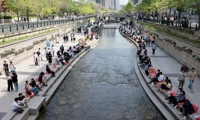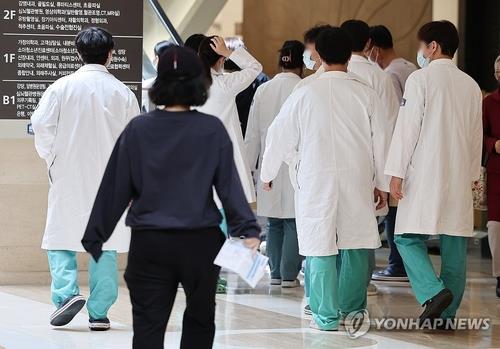Daily cases bounce to over 7,000 for 1st time in month amid omicron woes
SEOUL, Jan. 22 (Yonhap) -- South Korea's daily coronavirus cases jumped to over 7,000 for the first time in a month on Saturday amid the fast spread of the omicron variant.
The country added 7,009 new COVID-19 infections, including 6,729 local infections, raising the total caseload to 726,274, according to the Korea Disease Control and Prevention Agency (KDCA).
It is the first time since mid-December that the number of daily infections stayed above 7,000.
The daily tally has surged at a fast pace this week from the 4,000 level to over 5,000 on Wednesday and to above 6,000 on Thursday.
The country reported 28 more COVID-19 deaths, raising the death toll to 6,529. The fatality rate came to 0.90 percent.
The number of critically ill COVID-19 patients stood at 433, the KDCA said.
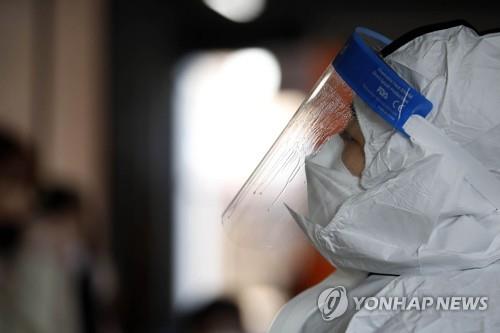
A health worker closes their eyes while working at a makeshift COVID-19 testing station in the southwestern city of Gwangju on Jan. 21, 2022, in this photo provided by a local government. (PHOTO NOT FOR SALE) (Yonhap)
The health authorities have warned of a resurgence in the number of infections as the highly transmissible omicron variant could become the dominant COVID-19 variant in South Korea.
The KDCA also vowed to implement a new medical response system in order to handle the pandemic in a flexible manner in case the daily tally exceeds 7,000.
The detection rate of the omicron variant reached 47.1 percent this week, and it is likely to account for more than half of all infections next week, the KDCA said.
Amid deepening omicron woes, the government has implemented toughened antivirus curbs, including a 9 p.m. curfew on restaurants and cafes, which have been in place since mid-December and will remain effective until Feb. 6.
Currently, the limit on the size of private gatherings is set at six, and the vaccine pass program is required at several kinds of multiuse facilities, including cafes, restaurants and sports arenas.
This week, the government also began implementing extra antivirus steps ahead of the Lunar New Year holiday. This year's Lunar New Year falls on Feb. 1, and the holiday lasts until Feb. 2.
During the two-week special quarantine period from Thursday, face-to-face meetings at nursing facilities will be banned, and non-contact meetings will be allowed only after prior reservations.
Dining in at highway service areas will be banned, the KDCA said, adding that nine temporary COVID-19 testing stations will be set up at highway rest areas, and bus and train stations across the country.
As of Saturday, 43.78 million people, or 85.3 percent of the country's 52 million population, have been fully vaccinated, and 24.97 million, or 48.6 percent, have received booster shots, the health authorities said.
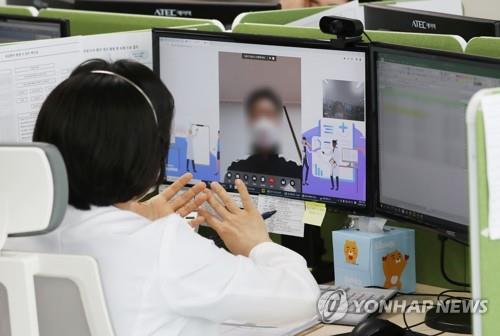
A medical worker talks to a coronavirus-infected patient via video link at a medical facility in Seongnam, near Seoul, on Jan. 21, 2022, as the patient is being treated at home with Paxlovid, COVID-19 treatment pills developed by U.S. pharmaceutical giant Pfizer Inc. (Pool photo) (Yonhap)
graceoh@yna.co.kr
(END)
-
 Overdue debut of Korean abstract art pioneer Yoo Young-kuk at Venice Biennale
Overdue debut of Korean abstract art pioneer Yoo Young-kuk at Venice Biennale -
 Defense chief says N. Korea's hypersonic missile 'unsuccessful' in last-stage glide flight
Defense chief says N. Korea's hypersonic missile 'unsuccessful' in last-stage glide flight -
 Relax, immerse yourself in scents at Venice Biennale's Korean Pavilion
Relax, immerse yourself in scents at Venice Biennale's Korean Pavilion -
 N. Korea has capability to genetically engineer biological military products: U.S. report
N. Korea has capability to genetically engineer biological military products: U.S. report -
 S. Korea marks 30th anniv. of Korean Pavilion at Venice Biennale with contemporary art
S. Korea marks 30th anniv. of Korean Pavilion at Venice Biennale with contemporary art
-
 Overdue debut of Korean abstract art pioneer Yoo Young-kuk at Venice Biennale
Overdue debut of Korean abstract art pioneer Yoo Young-kuk at Venice Biennale -
 Relax, immerse yourself in scents at Venice Biennale's Korean Pavilion
Relax, immerse yourself in scents at Venice Biennale's Korean Pavilion -
 Artist Lee Bae captures ethereal Korean aesthetics at Venice Biennale
Artist Lee Bae captures ethereal Korean aesthetics at Venice Biennale -
 S. Korea marks 30th anniv. of Korean Pavilion at Venice Biennale with contemporary art
S. Korea marks 30th anniv. of Korean Pavilion at Venice Biennale with contemporary art -
 Defense chief says N. Korea's hypersonic missile 'unsuccessful' in last-stage glide flight
Defense chief says N. Korea's hypersonic missile 'unsuccessful' in last-stage glide flight
-
 Facebook page unveils photos of BTS member V in counter-terrorism unit gear
Facebook page unveils photos of BTS member V in counter-terrorism unit gear -
 Gov't likely to accept university chiefs' request to lower med school enrollment quota
Gov't likely to accept university chiefs' request to lower med school enrollment quota -
 S. Korea not invited to G7 summit meeting this year: sources
S. Korea not invited to G7 summit meeting this year: sources -
 Yoon's approval rating sinks to lowest point since taking office
Yoon's approval rating sinks to lowest point since taking office -
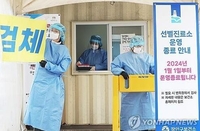 S. Korea to fully shift to 'endemic' from COVID-19 pandemic starting next month
S. Korea to fully shift to 'endemic' from COVID-19 pandemic starting next month


















